- Home
- Peter Carey
Oscar and Lucinda Page 50
Oscar and Lucinda Read online
Page 50
But only the longest and most beautiful dream transcended the jolting, jogging rhythms of the wagon. It involved a glass-house shaped like a seamless teardrop; the teardrop suspended in a wire net; the net held by cast-iron rods out from a cliff above the sea. On the sand below was the refuse from his other dreams, those enormous pink shells, his mother’s buttons, a sherry bottle.
In his dream he had one thought which turned and turned on itself like a shining steel corkscrew. The thought was this: I am not afraid.
Wardley-Fish returned to Sydney in the company of a travelling draper of exotic extraction. He was indebted to the man for the trousers he wore.
99
An Old Blackfellow
The sand for our glassworks did not come from Bellingen, but from Yellow Rock, which is on the coast, not far from where Mr Jeffris’s party finally emerged from the bush.
The sand at Yellow Rock is not as good as the Botany sand which Dennis Hasset, and others before him, tried to promote in London and Sydney, but it is good enough sand. It produces a glass with a faint yellow tinge, the effect of which, in the windows of old Bellinger Valley farmhouses, is to make the kikuyu pastures a particularly dazzling green.
The sand was held in big corrugated-iron hoppers and when these ran low my father would employ a gang of men and we would take three wagons over to Yellow Rock and load them. I say “we” because I went too, even—and I cannot see how this was so, except that it was—even on a school day. We would stay overnight at the Old Blacks’ Camp.
The Old Blacks’ Camp consisted of seven weatherboard huts, built in a row. They were constructed after the style of the so-called “shelter sheds” which are still the feature of school playgrounds around Australia. They were bleak places, each with a single “room,” a single door, three steps, one window. In these huts the surviving members of the Kumbaingiri tribe lived, and died.
The only one I remember is the one they called Kumbaingiri Billy. More commonly he was known as Come-and-get-it Billy. I do not know his real name, or even his age.
My father liked Kumbaingiri Billy. He always brought him bacon. I think they were friends, proper friends. They drank tea together. My father never made jokes about him. Once he said: “Kumbaingiri Billy has more brains in his nose than the whole shire council wrapped into one.”
When I was ten, Kumbaingiri Billy told the story of “How Jesus come to Bellingen long time-ago.” Afterwards I made a patronizing joke about it and my father hit me around the legs with the electric flex from the kettle. I didn’t make jokes about it again, although I listened to the story a number of times. Kumbaingiri Billy must have first heard it when he was very young, and now I think about it it seems probable that its source is not amongst the Kumbaingiri but the Narcoo blacks whom Mr Jeffris conscripted at Kempsey to guide the party on the last leg of its journey. But perhaps it is not one story anyway. The assertion that “our people had not seen white people before” suggests a date earlier than 1865 and a more complex parentage than I am able to trace.
100
Glass Cuts
The white men came out of the clouds of Mount Darling. Our people had not seen white men before. We thought they were spirits. They came through the tea-trees, dragging their boxes and shouting. The birds set up a chatter. What a noise they all made. Like twenty goannas had come at once to raid their nests. Anyway, it was not nesting time.
We thought they were dead men. They climbed hills and chopped down trees. They did not cut down the trees for sugar bag. There was no sugar bag in the trees they chopped. They left the trees lying on the ground. They cut these trees so they could make a map. They were surveying with chains and theodolites, but we did not understand what they were doing. We saw the dead trees. Soon other white men came and ring-barked the trees. At that time we made a song:
Where are the bees which grew on these plains?
The spirits have removed them.
They are angry with us.
They leave us without firewood when they are angry.
They’ll never grow again.
We pine for the top of our woods,
but the dark spirit won’t send them back.
The spirit is angry with us.
The white men spoke to two men of the Narcoo tribe. They were young men. They gave the white men a big kangaroo, and some coberra. The white men would not eat the coberra. They told the Narcoo men to show them the way to the Kumbaingiri, although the Narcoo men had never seen anyone from that tribe. They were neighbours, but they did not visit.
The Narcoo men said: “You wait here.”
They went back to the tribes and the elders had a big talk and then they told the young men: “You keep them buggers going quick and smart.”
So that is what the young men did. They showed them the way, although it was not easy. They had seven wagons. Sometimes the boss would say: “We going to camp here.” And then he would gallop off and chop down trees and make more maps. Then he would come back and say: “Right you are, we go now.”
It was in these camps the young fellows learned about Jesus. This was the first time they ever heard of such a thing. They were told the story of Jesus nailed to the cross. They were told by the Reverend Mr Hopkins. Whenever they crossed a river this fellow had to lie on his back first. Then he would put a tin funnel in his mouth and then they would fill him up with grog. He must have been drunk, but the young men were never offered the bottle so they did not find out what it was he drank.
The Reverend Mr Hopkins told the Narcoo men the story of St Barnabas eaten by a lion. He told them the story of St Catherine killed with a wheel. He told them the story of St Sebastian killed with spears.
Naturally the Narcoo men misunderstood many things, but many things they understood very well. One thing they did not understand was the boxes on the wagons: they got the idea these boxes were related to the stories. They thought they were sacred. They thought they were the white man’s dreaming.
Coming down Mount Leadenhall it was so steep they were lowering wagons on pulleys and ropes. It was a great bloody mess with ropes tied to trees and bullocks pulling up so the wagons would get lowered down. There was an accident. One of the boxes fell. Straight away the white fellows opened up this box. Naturally the Narcoo men were keen to see what was inside.
You know what they saw? It was glass. Up until that time they had not seen glass. There was glass windows down in Kempsey and Port Macquarie, but these fellows had not been to those places. They saw the glass was sharp. This was the first thing they noticed—that it cuts. Cuts trees. Cuts the skin of the tribes.
When the white men wanted to cross Mount Dawson, the Narcoo men did not wish them to. Mount Dawson was sacred. The young men were forbidden to go there. It was against their law. Then the leader of the white men shot one of the Narcoo men with his pistol. The other Narcoo man was named Odalberee. This Odalberee took them up Mount Dawson, and down towards the Bellinger Valley. He made a song.
Glass cuts.
We never saw it before.
Now it is here amongst us.
It is sacred to the strangers.
Glass cuts.
Glass cuts kangaroo.
Glass cuts bandicoot.
Glass cuts the trees and grasses.
Hurry on, strangers.
Hurry on to the Kumbaingiri.
Leave us, good spirits, go, go.
Odalberee led them down towards the coast at Uranga. He thought he should take them towards the sea so they could go away. But on the last night, when they were almost there, the Kumbaingiri knew there were strangers in their country. The Kumbaingiri came with torches at night. They walked through the bush to talk to the strangers. But the strangers got frightened. Odalberee got frightened too. The Kumbaingiri men did not understand him. Then there was a lot of shooting.
The Reverend Mr Hopkins made a big fuss. He shouted. He ran about.
The leader of the white men said: “Tie that fellow up.”
They
tied him up to a tree down in a gully. There were two men with him to keep him safe. Then they went back and fired more rifles at the Kumbaingiri. You could hear the red-haired man wailing. He was like a ghost in the night.
The next day Odalberee went off and found the Kumbaingiri again. He told the story of everything that had happened to him. He cut himself. He brought glass with him, wrapped in a possum skin. He was sick to have caused such death. He cut himself not only on the chest, but on the arms. He did this with the glass.
In a short time Odalberee was very sick. No one could cure him. Before too long he died.
That glass was kept a long time by the elders of the Kumbaingiri, but it was not kept with the sacred things. It was kept somewhere else, where it would not be found.
101
Oscar at Bellingen Heads
When Oscar Hopkins arrived at the banks of the Bellinger, he had changed. Those limpid eyes, which had once irritated Wardley-Fish with their “holy” pose, now showed a dull, ash-covered anger. His face was burnt a painful vermilion and his nose—due to an illusion created by the peeling skin—seemed to have grown large and slightly hooked. It was a gaunt, scraped-out kind of personality you saw there, scarred by bushfire, incapable of so fat a luxury as tears. He was a red salmon as it enters the waters of its home river where it will spawn and die, no longer plump and silver but with its belly empty, its jaw become long and hooked, its whole body bright red and splendidly, triumphantly ugly.
Mr Jeffris’s party found the Bellinger River at a place where the Narcoo man judged they would do the least amount of damage. This was at Urunga, a wounded place in any case. In those days it was called Bellingen Heads.
As they came down the dry and pebbly ridge towards the high white trees, the Narcoo man slipped away. Mr Jeffris took a pot-shot, but with no real intention of killing—just a shot which threw the white cockatoos into the air like screeching feathers from a burst pillow.
Oscar sat beside Mr Smith under the canvas awning of the “Ladies’ Compartment.” Mr Smith was sharpening his axe on a stone. The laudanum bottle sat between them, but the humiliating funnel was nowhere in evidence. Since the slaughter at Sandy Creek, Oscar had administered his own laudanum. He kept a small clear-glass bottle in his jacket pocket which he replenished from the large stone demijohn. He sipped on it from time to time, but it was like water on a rock-hot fire—it gave off steam, but did not stop the heat. He sat on the hard wooden seat beside the silent Mr Smith who seemed to have contracted his whole being into the shadow of his hat. Mr Smith honed his axe. He had honed it for a long time now. Oscar Hopkins was drunk on laudanum. He sat with his back to the carefully labelled crates of glass and iron. He rubbed at the brown-stained bandages on his wrist. He knew his rope burns to be infected, but could not bear to speak of this, or any other matter, to Mr Jeffris who, now they were almost arrived at their destination, had begun to change in his manner towards him so that he could, cantering back up the hill towards him, actually smile and, without either apology or irony, ask him was it not sweet to be alive.
Mr Jeffris was content. He had not made a great exploration—you could not have a great exploration with seven wagons in mountainous country—but he had done sound work, which would serve as evidence of his ability to lead other expeditions. He had put names to several largish creeks. He had set the heights of many mountains which had previously been wildly misdescribed. He had established a reputation for courage, having led his party through places inhabited by desperate blacks. His journals recorded that he had “given better than we took” from the “Spitting Tribe.” Also: “6 treacherous knaves” from the Yarra-Happini had been “dispatched” by their guns. He had also successfully defended the party from the “murderous Kumbaingiri.” He recorded all this in a neat and flowing hand which gave no indication of the peculiarities of his personality. His sketches of the countryside, the long ridges of mountains etc, were as good as anything in Mitchell’s journals.
When he cantered up the ridge towards Messrs Smith and Hopkins, he felt as fresh and clean as the morning he had left Port Jackson, felt far better, for on that occasion he had suffered a mild case of jitters, a looseness of the bowels which had been difficult to hide from men with a keen eye for weakness.
Mr Smudge was “not talking” to him. So, he thought, we have our little tiff. And a smile, he could not help it, ruffled the smooth cloak of concern he had arranged on his handsome face. Mr Smudge had still not attended to his toilet. There was a sprinkling of ginger hair upon his chin and some black charcoal marks on his ears where he had been scratching his mosquito bites. He was a contrast to his companion who was, as usual, neatly kitted out in fresh-washed twill and cotton. Yet you could not conclude from this that one had “character” whilst the other had not. They were a pair, in Jeffris’s eyes, and he thought the “Ladies’ Compartment” aptly named.
Mr Jeffris had, perhaps, been too harsh with Mr Smudge. But the man was alive, was he not? He would be delivered as requested. He was not speared or poisoned by serpents. He had seen things no Sydney clerk would ever dream of seeing: life, death, savages. He had eaten snake and played the missionary. And now he should not be sitting on his car with his ramrod back, but should be throwing his hat in the air and offering to shout his protectors’ drinks. They had guaranteed his place in history.
It was such a crisp, clear day and the ridge was almost as good as Her Majesty’s highway. Mr Jeffris brought his stallion to a trot and rode beside the “Ladies’ Compartment” for a piece. The view was splendid: the Bellinger estuary swept beneath them like an illustration to a fairy tale: strokes of aqua, gold, turquoise. Three pelicans thrust out their chests and glided on the air below.
“Well, Mr Hopkins,” said Mr Jeffris, as he plucked a blood-bloated tick from his stallion’s neck. “What do you say to that?”
“To what?” the clergyman said abruptly, turning his haughty red face briefly towards his questioner before looking back again. Beside him, Mr Smith honed his axe, and hid his anger and self-loathing from no one.
“What do you say,” insisted Mr Jeffris, “to this, the countryside?”
“If it was my country, sir, I would be feared to see you coming.”
Mr Jeffris laughed, a harsh, impatient laugh.
“And I would pray to God to forgive you, and all of us who are of your party.”
“It has been an education for you,” said Mr Jeffris complacently. “That I can understand.”
Oscar said nothing. His anus itched beyond belief. He thought: If I were a strong man I would leap on him now and commit the sin of murder.
“Churches are not carried by choirboys,” said Mr Jeffris. “Neither has the Empire been built by angels,” and he would have said more on the subject, for it was one he had a secret passion for, and his hand had just drifted to his broad moustache which he would stroke as he gathered in the strands of his defence, when he was interrupted by that bow-legged gentleman, the plant collector, who was, as usual, wanting to go cantering away from the main party, and wished to take the carpenter as “bodyguard.” As it was Mr Jeffris’s agreement that he had the rights of sale of all the plant collector’s delicate drawings, he was more than pleased to humour him.
The subjects of Empire and angels were forestalled by other calls on his attention, and finally he gave up. “We will drink,” he shouted as he trotted back to settle some dispute that his brightly tattooed overseer was in the process of beginning. “We will drink champagne and send a message on the mail boat to Miss Leplastrier.”
Oscar made a small noise, a little grunt of pain. In relationship to Miss Leplastrier, he felt only that he was a coward and complicitous in murder. As the wagon banged and thumped down the ridge into Bellingen Heads, its wooden brake squealing on the last steep drop, Oscar made a pair with his hunched and silent companion. He saw, in every blackened stump, every fallen log, in every shadow beneath a she-oak or turpentine, the same crumpled dark bodies, the frail and tender envelopes of
human souls. He sought his laudanum. He imagined he could smell blood, and perhaps he could, for his own bandages were caked with it.
There were two taverns at Bellingen Heads and, discounting some grey neglected tents with dull, fat-leaved weeds growing along their perimeter drains, nothing else. The taverns faced each other across a sandy flat in the centre of which was a greenish-coloured waterhole surrounded by a ring of faeces. He and Mr Smith remained in their seat while the teams were unhitched and watered there, but when this lengthy business was at last completed Oscar climbed down.
“Come, Smith.”
“Oh, God, man,” said Percy Smith. “Surely you are not going to drink with them?”
Oscar said: “I have already travelled with them.”
Inside the tavern he placed his injured hands flat on a rough table. There was a smell here which was like a condensation of that slightly off odour, that blocked-drain smell which, mixed with salt air, was the distinctive odour of Sydney. There were small black flies everywhere. They climbed across his bandages, his face, across the lids of his eyes. He felt he had travelled to the very heart of New South Wales.
He did not wear his “uniform,” but the shiny, frayed black suit he had worn as both clergyman and clerk. He had a collarless white shirt from which his long white neck sprouted to his staring crimson face and blooming ginger hair. He sat with his back very straight against the wall and held his hands together across his chest. He thought: I will smite them all.
He trembled. He glared around the room at whiskered faces which not only stared back at him, but more often, laughed and pointed.
He said: “The pillars of society.”
He thought: What would God have me do? He saw, in his mind, his father’s face. He sighed.
He was the subject of much curiosity. He himself felt only that he was in an evil place. He had no curiosity beyond that. Yet the little tavern was filled with curiosities. The bar was made from a single three-foot-wide plank of cedar. The walls had pennies and florins driven into place with six-inch nails. A couple seemed to be having sexual congress on the other side of the torn curtain through which men—short, for the most part, broad and shovel-bearded, none of them too steady on their feet—would occasionally come and go.

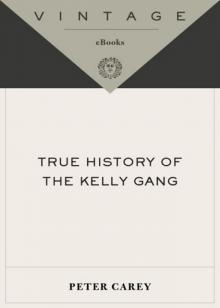 True History of the Kelly Gang
True History of the Kelly Gang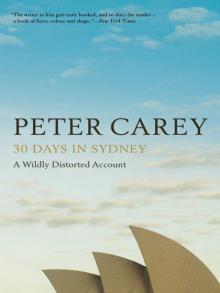 30 Days in Sydney: A Wildly Distorted Account
30 Days in Sydney: A Wildly Distorted Account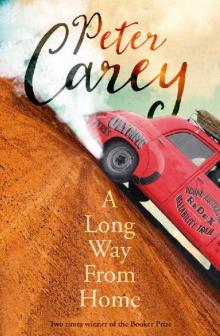 A Long Way From Home
A Long Way From Home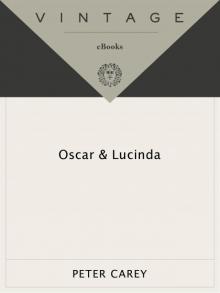 Oscar and Lucinda
Oscar and Lucinda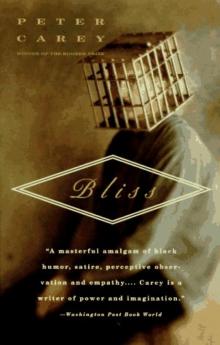 Bliss
Bliss Wrong About Japan
Wrong About Japan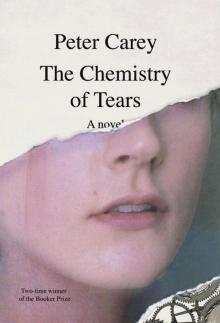 The Chemistry of Tears
The Chemistry of Tears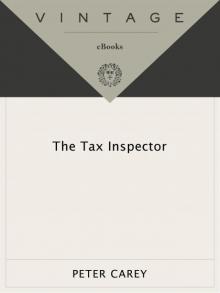 The Tax Inspector
The Tax Inspector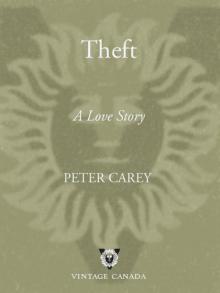 Theft: A Love Story
Theft: A Love Story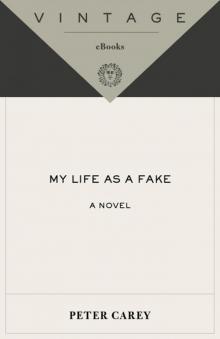 My Life as a Fake
My Life as a Fake Collected Stories
Collected Stories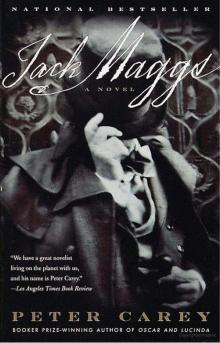 Jack Maggs
Jack Maggs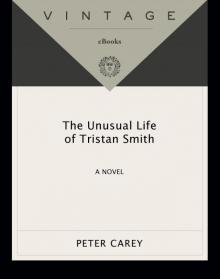 The Unusual Life of Tristan Smith
The Unusual Life of Tristan Smith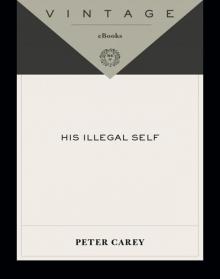 His Illegal Self His Illegal Self His Illegal Self
His Illegal Self His Illegal Self His Illegal Self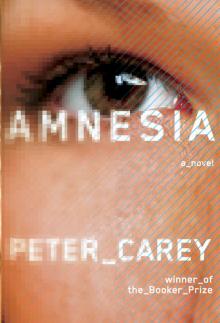 Amnesia: A Novel
Amnesia: A Novel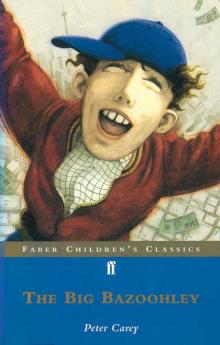 The Big Bazoohley
The Big Bazoohley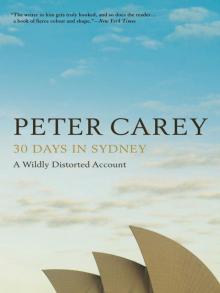 30 Days in Sydney
30 Days in Sydney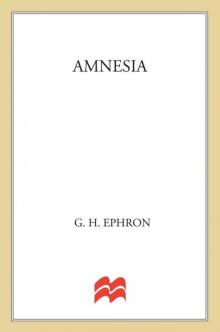 Amnesia
Amnesia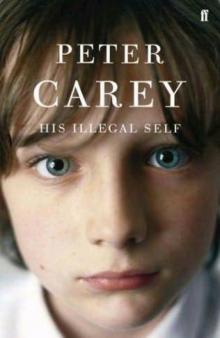 His Illegal Self
His Illegal Self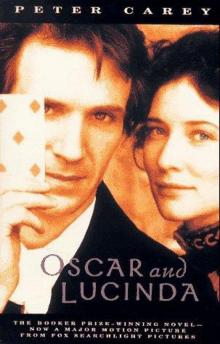 Oscar and Lucinda bw-1988
Oscar and Lucinda bw-1988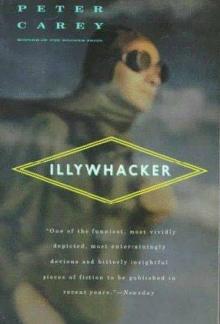 Illywhacker
Illywhacker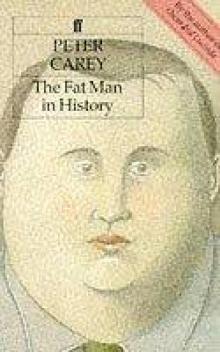 The Fat Man in History aka Exotic Pleasures
The Fat Man in History aka Exotic Pleasures